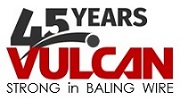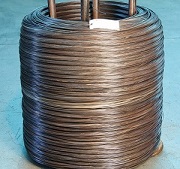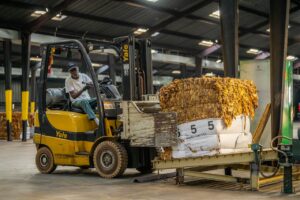
It’s important to know which kind of wire to use with your baler. The two most common types of wire used for bale ties are annealed wire and galvanized wire. Each has different traits, strengths, and weaknesses, and knowing these differences will help you determine which option is right for you.
Annealed Wire
Annealed wire gets its properties from the distinct manufacturing and treatment process used to make it. The steel wire must undergo a heating and cooling cycle to change its properties. The result is a wire that’s strong, flexible, and pliable. Once this process is finished, the wire is treated with a layer of oil.
Pros of Annealed Wire
Due to its unique manufacturing process, annealed wire develops flexibility that it otherwise would not have had. This allows it to be used in applications where the wire needs to be pliable enough to let material expand or stretch after being baled. Thus, the annealed wire has greater versatility in use.
Cons of Annealed Wire
The main downfall of annealed wire is that the process of annealing alters the composition of the steel. The annealed wire is more prone to rust, which makes the wire “dirty” when left out in the elements. But the rust does not necessarily affect the strength of the wire.
Galvanized Wire
Galvanized wire gets its name from the galvanization process. When a steel wire is coated in zinc, it becomes galvanized. This process happens after the steel wire was manufactured to the necessary thickness and gauge. Galvanized wire is a bit stiffer has less flexibility than annealed wire. It also lacks the same oil coating that annealed wire gets.
Pros of Galvanized Wire
You can trust galvanized wire to keep its structural integrity, making it a strong and durable option that can be used with a variety of different materials. The galvanized wire is also not recommended to leave out in the elements for an extended period of time before it’s used. But it is more resistant to rust and corrosion, which keeps the wire “cleaner” and having longer life without losing any break strength.
Cons of Galvanized Wire
Since galvanized wire is less flexible and cannot be elongated, its uses may be limited when you need a wire that can stretch after being tied.
Which Should You Choose?
The only way to know which wire to choose is to be sure of your application. When you need a wire that is strong, durable, and can be used in wet conditions, go with galvanized wire. If you need a more pliable wire, an annealed wire is your best bet. Since there are many cases of use for both types of wire, you’ll have to weigh the pros and cons of each wire in relation to the specific application.
Shop Baling Wire from Vulcan Wire, Inc.
If you need assistance determining which type of wire is right for you, don’t hesitate to contact us at Vulcan Wire, Inc. today. When you’re ready to make your purchase, we offer black annealed wire and high-tensile galvanized wire in several sizes and gauges to meet any of your baling needs. We look forward to serving you!






















